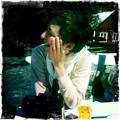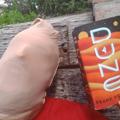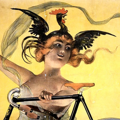1) "Do not laugh! But once upon a time (my crest has long since fallen) I had a mind to make a body of more or less connected legend, ranging from the large and cosmogonic, to the level of romantic fairy-story -- the larger founded on the lesser in contact with the earth, the lesser drawing splendour from the vast backcloths -- which I could dedicate simply to: to England; to my country."
2) "In the beginning Eru, the One, who in the Elvish tongue is named Ilúvatar, made the Ainur of his thought; and they made a great Music before him. In this Music the World was begun; for Ilúvatar made visible the song of the Ainur, and they beheld it as a light in the darkness. And many among them became enamoured of its beauty, and of its history which they saw beginning and unfolding as in a vision. Therefore Ilúvatar gave to their vision Being, and set it amid the Void, and the Secret Fire was sent to burn at the heart of the World; and it was called Eä."
3) "Then Manwë and Yavanna parted for that time, and Yavanna returned to Aulë; and he was in his smithy, pouring molten metal into a mould. 'Eru is bountiful,' she said. 'Now let thy children beware! For there shall walk a power in the forests whose wrath they will arouse at their peril!'
'Nonetheless they will have need of wood,' said Aulë, and he went on with his smith-work."
4) "But in the north Melkor built his strength, and he slept not, but watched, and laboured; and the evil things that he had perverted walked abroad, and the dark and slumbering woods were haunted by monsters and shapes of dread. And in Utumno he gathered his demons about him, those spirits who first adhered to him in the days of his splendour, and became most like him in his corruption: their hearts were of fire, but they were cloaked in darkness, and terror went before them; they had whips of flame. Balrogs they were named in Middle-earth in later days. And in that dark time Melkor bred many other monsters of divers shapes and kinds that long troubled the world; and his realm spread now ever southward over Middle-earth.
And Melkor made also a fortress and armoury not far from the north-western shores of the sea, to resist any assault that might come from Aman. That stronghold was commanded by Sauron, lieutenant of Melkor; and it was named Angband."
5) "It is told that at this time the Swarthy Men came first into Beleriand. Some were already secretly under the dominion of Morgoth, and came at his call; but not all, for the rumour of Beleriand, of its lands and waters, of its wars and riches, went now far and wide, and the wandering feet of Men were ever set westward in those days. These Men were short and broad, long and strong in the arm; their skins were swart or sallow, and their hair was dark as were their eyes."
6) "Yet not all the Eldalië were willing to forsake the Hither Lands where they had long suffered and long dwelt; and some lingered many an age in Middle-earth. Among those were Círdan the Shipwright, and Celeborn of Doriath, with Galadriel his wife, who alone remained of those who led the Noldor to exile in Beleriand. In Middle-earth dwelt also Gil-galad the High King, and with him was Elrond Half-elven, who chose, as was granted to him, to be numbered among the Eldar; but Elros his brother chose to abide with Men. And from these brethren alone has come among Men the blood of the Firstborn and a strain of the spirits divine that were before Arda; for they were the sons of Elwing, Dior's daughter, Lúthien's son, child of Thingol and Melian; and Eärendil their father was the son of Idril Celebrindal, Turgon's daughter of Gondolin.
But Morgoth himself the Valar thrust through the Door of Night beyond the Walls of the World, into the Timeless Void; and a guard is set for ever on those walls, and Eärendil keeps watch upon the ramparts of the sky. Yet the lies that Melkor, the mighty and accursed, Morgoth Bauglir, the Power of Terror and of Hate, sowed in the hearts of Elves and Men are a seed that does not die and cannot be destroyed; and ever and anon it sprouts anew, and will bear dark fruit even unto the latest days.
Here ends the SILMARILLION. If it has passed from the high and the beautiful to darkness and ruin, that was of old the fate of Arda Marred; and if any change shall come and the Marring be amended, Manwë and Varda may know; but they have not revealed it, and it is not declared in the dooms of Mandos."














